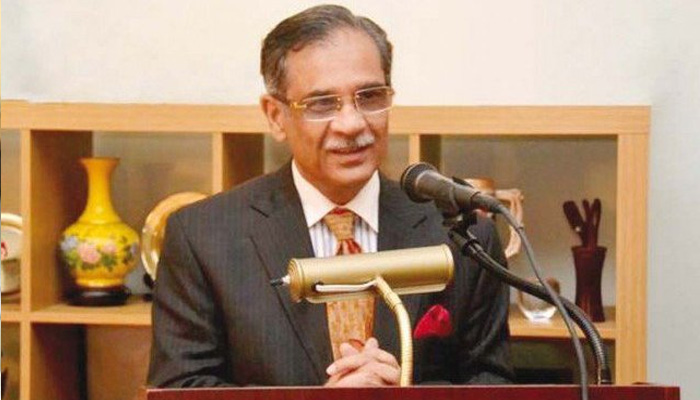SC decides to regulate suo motu powers
The Supreme Court Friday decided to regulate its suo motu powers exercised under Article 184(3) of the Constitution and issued notices to the Pakistan Bar Council (PBC), Supreme Court Bar Association (SCBA) and Attorney General for Pakistan.
ISLAMABAD: The Supreme Court Friday decided to regulate its suo motu powers exercised under Article 184(3) of the Constitution and issued notices to the Pakistan Bar Council (PBC), Supreme Court Bar Association (SCBA) and Attorney General for Pakistan.
The top court exercises its suo motu powers while dealing with important public matters. A three-member bench of the apex court, headed by Chief Justice of Pakistan (CJP) Mian Saqib Nisar, heard the case.
Justice Umer Ata Bandial and Justice Ijazul Ahsen are two other members of the bench. The chief justice said the top court wanted to regulate its suo motu powers granted under Article 184(3) of the Constitution of Pakistan.
He said the court also wanted to know whether or not the apex court was exceeding its jurisdiction while exercising its [suo motu] powers. Attorney General for Pakistan Anwar Mansoor Khan appeared before the court.
Addressing the attorney general, the chief justice said they wanted to examine the scope of court powers with respect to Article 184(3). The chief justice said they will take the assistance of two senior lawyers as amici curie (friends of court) to assist it in this importance matter.
Article 184(3) reads, "Without prejudice to the provisions of Article 199, the Supreme Court shall, if it considers that a question of public importance with reference to the enforcement of any of the Fundamental Rights conferred by Chapter I of Part II is involved have the power to make an order of the nature mentioned in the said Article."
The hearing was adjourned for an indefinite period. The International Commission of Jurists (ICJ) in 2011 had said that the Supreme Court should exercise caution and restraint in taking suo motu notices, explaining that the rule of law could be threatened due to its overuse.
-
 What You Need To Know About Ischemic Stroke
What You Need To Know About Ischemic Stroke -
 Shocking Reason Behind Type 2 Diabetes Revealed By Scientists
Shocking Reason Behind Type 2 Diabetes Revealed By Scientists -
 SpaceX Cleared For NASA Crew-12 Launch After Falcon 9 Review
SpaceX Cleared For NASA Crew-12 Launch After Falcon 9 Review -
 Meghan Markle Gives Old Hollywood Vibes In New Photos At Glitzy Event
Meghan Markle Gives Old Hollywood Vibes In New Photos At Glitzy Event -
 Simple 'finger Test' Unveils Lung Cancer Diagnosis
Simple 'finger Test' Unveils Lung Cancer Diagnosis -
 Groundbreaking Treatment For Sepsis Emerges In New Study
Groundbreaking Treatment For Sepsis Emerges In New Study -
 Roblox Blocked In Egypt Sparks Debate Over Child Safety And Digital Access
Roblox Blocked In Egypt Sparks Debate Over Child Safety And Digital Access -
 Savannah Guthrie Addresses Ransom Demands Made By Her Mother Nancy's Kidnappers
Savannah Guthrie Addresses Ransom Demands Made By Her Mother Nancy's Kidnappers -
 OpenAI Reportedly Working On AI-powered Earbuds As First Hardware Product
OpenAI Reportedly Working On AI-powered Earbuds As First Hardware Product -
 Andrew, Sarah Ferguson Refuse King Charles Request: 'Raising Eyebrows Inside Palace'
Andrew, Sarah Ferguson Refuse King Charles Request: 'Raising Eyebrows Inside Palace' -
 Adam Sandler Reveals How Tom Cruise Introduced Him To Paul Thomas Anderson
Adam Sandler Reveals How Tom Cruise Introduced Him To Paul Thomas Anderson -
 Washington Post CEO William Lewis Resigns After Sweeping Layoffs
Washington Post CEO William Lewis Resigns After Sweeping Layoffs -
 North Korea To Hold 9th Workers’ Party Congress In Late February
North Korea To Hold 9th Workers’ Party Congress In Late February -
 All You Need To Know Guide To Rosacea
All You Need To Know Guide To Rosacea -
 Princess Diana's Brother 'handed Over' Althorp House To Marion And Her Family
Princess Diana's Brother 'handed Over' Althorp House To Marion And Her Family -
 Trump Mobile T1 Phone Resurfaces With New Specs, Higher Price
Trump Mobile T1 Phone Resurfaces With New Specs, Higher Price




